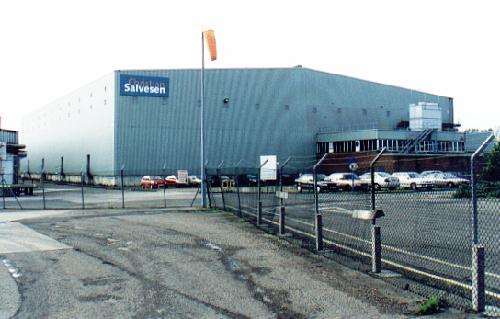|
Christian
Salvesen

Christian Salvesen Foods are one of Europe's biggest food processing companies, handling a wide variety of vegetables grown in the surrounding fens. For instance, their factory on the Cherryholt industrial estate in Bourne receives the pea crops from 31 local farmers and at the height of the season, 25 acres a day are being harvested to keep pace with production. Each acre produces an average of 1.7 tonnes and a normal daily schedule will mean a production total of 420 tonnes with a seasonal total of 14,000 tonnes.
Similar operations are mounted when other vegetables are ready for harvesting including green and broad beans, broccoli, Brussels sprouts, carrots, swedes and parsnips, where these vegetables are frozen for onward transmission to the packers. They are cleaned and finally selected in a continuous production line that eventually ends in them being packed into huge one-tonne cartons that are then stacked in massive, temperature-controlled cold stores ready to be moved by refrigerated truck to the various packaging plants at a moment's notice.
During this process, they are steam blanched and the latest technology is employed to take out any vegetables that have any defects so that the company's rigid quality control ensures that only the very best of the crop is included in the final selection.
For this reason, most of the frozen peas and other vegetables that you eat are likely to have come from Christian Salvesen. They have a turnover of £50 million and employ some 16,000 staff, operating 200 sites in eight countries, and have become the largest processors of frozen green vegetables in the United Kingdom where their customers include Birds Eye Wall's, the Co-operative Society, Somerfield, Tesco and
Waitrose.
|
£22,000 BILL AFTER CAUSING POLLUTION
Salvesen Logistics, which runs the vegetable processing plant at
Bourne and is one of the town's biggest employers, was ordered to
pay more than £22,000 in fines and costs after being found guilty of
causing pollution that left hundreds of fish dead.
The firm pleaded guilty at Bourne Magistrates Court on Wednesday
12th September 2007 to three charges of causing poisonous, noxious
or polluting matter to enter drains.
The dead fish were found downstream of the firm's site behind
Riddles Scrap Yard on 4th July 2006. Miriam Tordoff, prosecuting for
the Environment Agency, told the court that the three incidents
happened in July 2006. In the first, at the Tunnel Bank Drain on
July 4th, a black, bubbly liquid discharged into the drain,
affecting two miles of water. "Environment Agency officers found
peas and pea pods in the water", she said. "When they went to the
plant they saw a spillage in the yard and more peas and pea pods and
as they walked downstream the water became darker in colour. There
were also hundreds of fish gasping for air."
When agency officers were told of a later incident at the Partition
Drain on July 13th, they saw thick, brown water running from the
plant's final discharge point. The company suffered a similar
problem on July 24th.
Julian Hayes, defending, said that Salvesen Logistics took such
incidents very seriously. The firm had told the Environment Agency
about the incidents on July 13th and 24th . "The company has been
operating at the site in this form since 1986 with no problems", he
said. "The discharge on July 4th was a progressive problem which saw
a new harvest cause a build-up in an effluent pit. When the levels
did not recede, they installed booms, hired tankers to remove the
effluent and discovered that the pumps had been worn down by stones
in the loads."
He said the company had discovered that abnormally high ambient
temperatures in its treatment plant had caused a biological
imbalance. The situation was highly unusual and had since been
addressed. He added: "These three breaches were not deliberate or
reckless and were in no way profit-related. Salvesen does not cut
corners and stopped production during peak season, which cost it
£75,000, and has spent more than £50,000 on improvements."
He said the company had since fitted the plant with new pumps and
cleaned out the tanks and that in both incidents no other users had
been affected. No major clean-up had been required.
The company was fined £10,000 for the July 4th offence and £3,500
for each offence on July 13th and 24th. It was also ordered to pay
£5,008.61 in costs.
Reproduced from The Local
newspaper, Friday 14th September 2007 |
See
also The Pea Harvest

Go to:
Main Index Villages
Index
|
